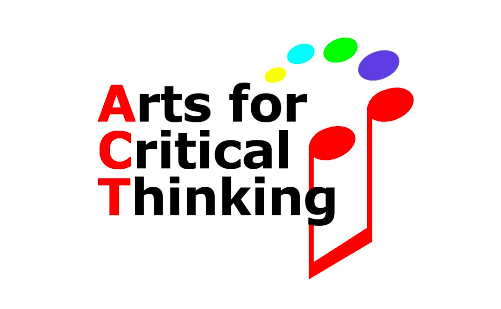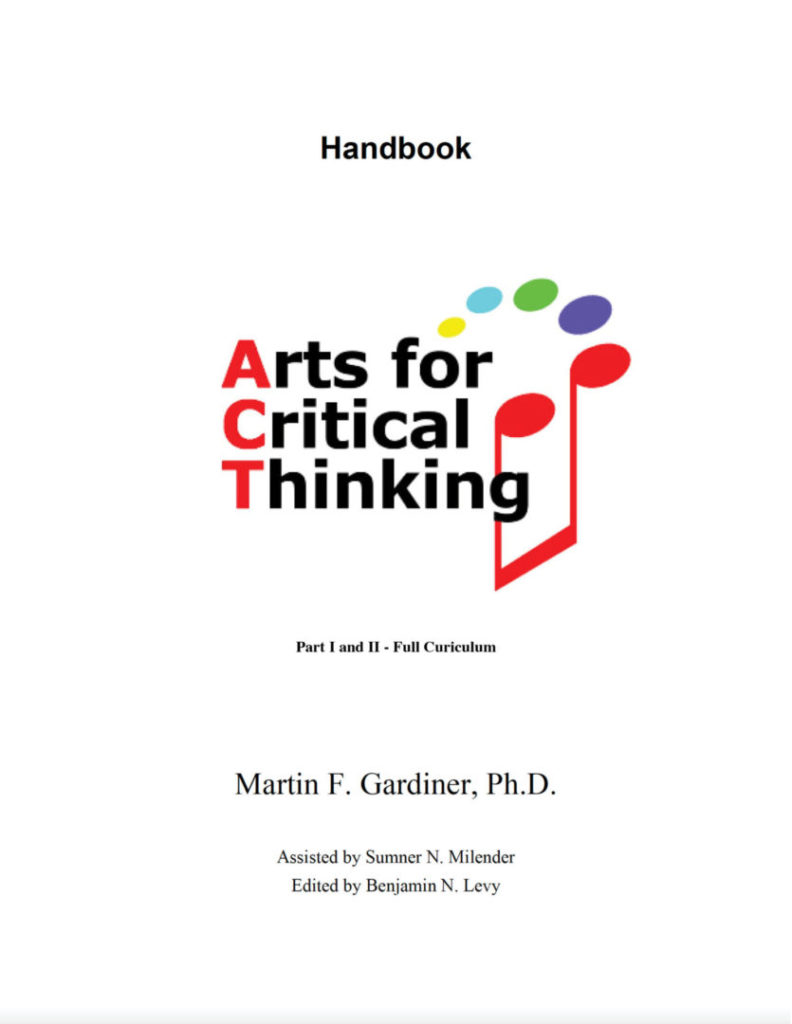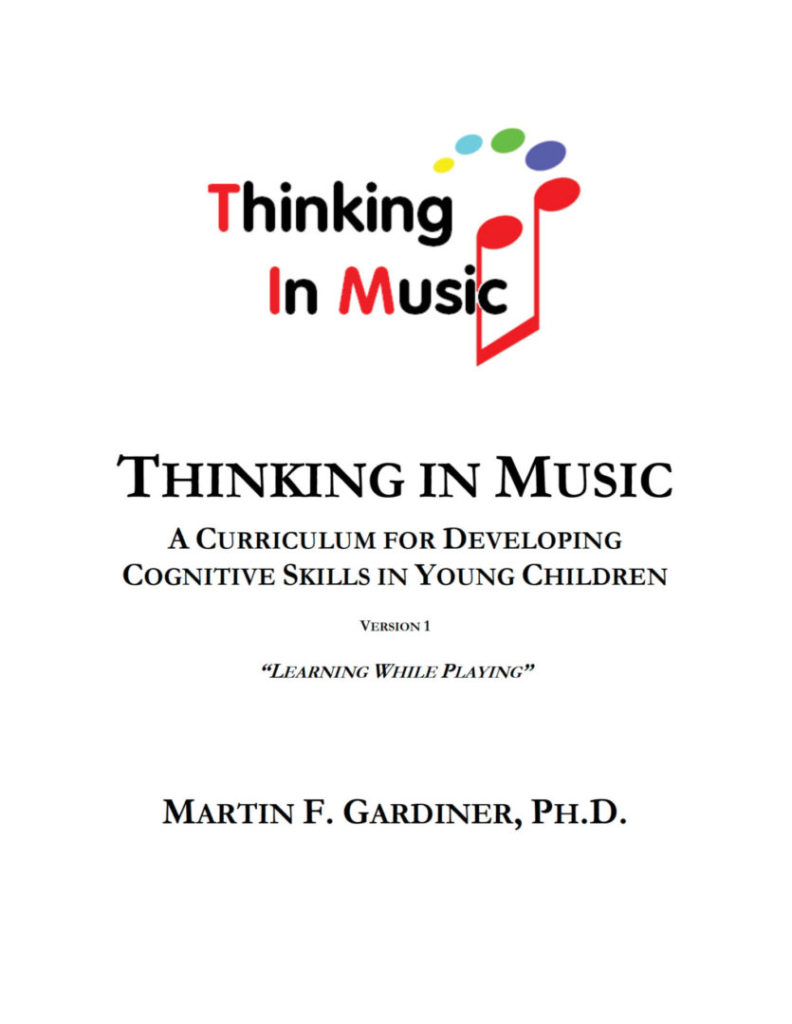Arts for Critical Thinking
Arts for Critical Thinking builds on research showing that skill learning in the arts and in other areas are interrelated.
The ACT Program uses music and visual arts to help students learn how to learn.
A Message From the Founder of ACT
ACT & TIM Curriculum Demonstrations
Curriculum and Certification Program Materials Available For Sale:
Thinking, Learning, Reflection, and Engagement Skills
The goal of ACT is to build thinking, learning, reflection, and engagement skills.
Music and other arts illustrate and develop many mental skills that are necessary for achievement in other academic areas. Data from research on this has been presented in leading publications. ACT builds on this research to prepare the student for the curriculum challenges of the school day.
ACT uses music and other arts to provide experience and practice at focusing, maintaining, and adjusting mental engagement (how the student conceptualizes and reflects on what is being learned), and in critical thinking that build on, assesses, and applies what is being learned. Through an Inquiry Learning approach, ACT also fosters student curiosity, initiative, and active involvement in learning.
Responses to initial development of ACT by teachers and students have been highly favorable.
Learning Through Engagement and Reflection
Learning Through Engagement and Reflection
ACT lessons have two parts, both of which are important to the fullest learning experience that ACT can provide.
The first part of each lesson contains activities that involve skill-developing engagement with music or visual arts and often related engagement involving mathematics or verbal arts.
The second part of each lesson (follow-up) provides students an opportunity to reflect upon what they have just experienced, to connect this learning to their broader interests and experiences.
Beginning with John Dewey, many educators have emphasize that both engagement and reflection are essential parts of the most useful learning.
Achievement in Mathematics
ACT fosters achievement in mathematics.
ACT creates a motivational atmosphere of physical engagement to promote active mathematics learning.
ACT fosters math skills by helping to develop mental skills for using mathematics effectively, building number sense, and then understanding of how and why mathematical operations on numbers are developed in the way they are and what they accomplish.
Achievement in Language Arts
ACT fosters achievement in language arts.
ACT fosters language acquisition by creating opportunities for students to practice verbal language while engaging with the arts in a structured yet open way.
ACT fosters writing skills by helping to develop mental skills needed for effective writing, by helping students to better understand what makes written language effective and by providing a motivational purpose for idea formation.
ACT fosters reading skills by helping to develop mental skills needed to read with understanding; and by providing both background information, which enables understanding of literature, and active involvolvement, which increases interest.

Arts for Critical Thinking (Copyright) (ACT) is a program aimed at helping teachers educate their students more effectively.
One great advantage that music and other arts bring to the task of educating children is the great pleasure these activities so often generate. Engaging in artistic activity is fun. Once children discover that it is even more fun to engage in artistic activities with skill, they will try hard to increase their enjoyment by becoming even more skillful at the activity.
Students must learn how to use their minds skillfully, of course, not only for the arts but for every area of skill, whether baseball, language arts, or mathematics. But there is growing evidence from current research that, as children develop specific skills at the arts, they become better at developing capability in other areas of skill – sometimes in mathematics, sometimes in language arts, sometimes in both. The best explanation for this is that every gull skill combines many elements, and the arts often incorporate some components of mental skill that are also used, though not entirely in the same way, in other applications of mental skill. That arts, then, can provide opportunities for students to learn, practice, and develop ways of thinking skillfully that can aid their learning not only in the arts, but also beyond the arts.
The ACT project develops teaching opportunities that build from this research. Elementary school students must learn not only facts, but also how to use their minds, to engage mentally with each area of their learning. ACT lessons show how to use music and visual arts to illustrate and help students develop mental skills they need in more general learning, and then to adapt these skills to math and language arts in the elementary grades.
ACT lessons are not intended to make every classroom teacher into a music and visual arts specialist; they do not diminish the importance of the music and visual arts specialists to elementary school training. ACT provides classroom teachers opportunities to use skillful engagement with the arts to support their general classroom teaching. These lessons are designed to be complete, but initial experiences with music and visual arts skills provided by ACT can stimulate a desire in many students to further develop their musical and other arts capabilities. If music and visual arts specialists are available, and can coordinate their teaching with ACT lessons by classroom teachers, students will build still deeper connections between arts skills and other academic skill learning. Classroom teachers should be aware of the potential values of further training in the arts so that they coordinate their teaching to benefit from it when it is available.
One significant reason for further training is the importance to every individual of arts for their own sake. Almost everyone finds value in some aspect of music or visual art, and all would find their world much less hospitable without music and visual art. Music and other arts enrich life intellectually, emotionally, and socially. Every student deserves initiation into music and other arts as part of a complete education. But the broader impact of arts skill training on other learning should be ignored. Research suggests that connections between skill learning in the arts and in other areas of skill come from similarities in the way the brain supports skill in different areas of application.
Additional training in the arts by specialists, in coordination with ACT, can be expected to increase the impact in both directions. Arts training should enhance the impact of ACT lessons on other classroom learning, and other classroom learning should make the work of the music and visual arts teachers easier as well. The evidence implies a win-win situation.
Martin F. Gardiner, Ph.D.
Center for the Study of Human Development
Brown University
Providence, Rhode Island

The ACT Program is dedicated to Edith Morse Milender, whose vision gave life to this project.




